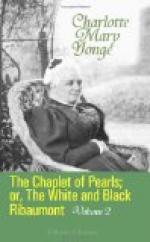‘That is not all, Master Isaac,’ said the Duchess, seriously. ’In spite of your much-respected name, evil and censorious tongues will have it that matters ought to be investigated; that there is some mystery; that the young woman does not give a satisfactory account of herself, and that the child does not resemble either her or your son—in short, that you may be deceived by an impostor, perhaps a Catholic spy. Mind, I say not that I credit all this, only I would show you what reports you must guard against.’
‘La pauvre petite!’ said Isaac, under his breath, as if appalled; then collecting himself, he said, ’Madame, these are well-nigh threats. I had come hither nearly resolved to confined in you without them.’
‘Then there is a mystery?’
’Yes, Madame, but the deception is solely in the name. She is, in very truth, a widow of a martyr of the St. Barthelemy, but that martyr was not my son, whose wife was happy in dying with him.’
‘And who, then, is she?’
‘Madame la Duchesse had heard of the family of Ribaumont.’
’Ha! M. de Ribaumont! A gay comrade of King Henry II., but who had his eyes opened to the truth by M. l’Amiral, though he lacked courage for an open profession. Yes, the very last pageant I beheld at court, was the wedding of his little son to the Count de Ribaumont’s daughter. It was said that the youth was one of our victims at Paris.’
’Even so, Madame; and this poor child is the little one whom you saw wedded to him.’ And then, in answer to the Duchess’s astonished inquiry, he proceeded to relate how Eustacie had been forced to fly from her kindred, and how he had first encountered her at his own lurking-placed, and had accepted her as a charge imposed on him by Providence; then explained how, at La Sablerie, she had been recognized by a young gentleman whom she had known at Paris, but who professed to be fleeing to England, there to study the Protestant controversy; and how she had confided to him a letter to her husband’s mother, who was married in England, begging her to send for her and her daughter, the latter being heiress to certain English estates, as well as French.
‘Madame,’ added Gardon, ’Heaven forgive me, if I do the Youth injustice by suspecting him, but no answer ever arrived to that letter; and while we still expected one, a good and kindly citizen, who I trust has long been received into glory, sent me notice that a detachment of Monsieur’s army was on its way from La Rochelle, under command of M. de Nid de Merle, to search out this poor lady in La Sablerie. He, good man, deemed that, were we gone, he could make terms for the place, and we therefore quitted it. Alas! Madame knows how it fared with the pious friend we left. Little deeming how they would be dealt with, we took our way along the Sables d’Olonne, where alone we could be safe, since, as Madame knows, they are for miles impracticable for troops. But we had another




